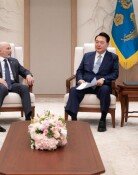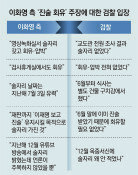National Assembly should abolish inspections
National Assembly should abolish inspections
Posted January. 24, 2014 07:37,
Parliamentary leaders of both ruling and opposition parties have tentatively agreed to have inspections of government agencies twice a year, each in the first and second half of the year. Parliamentary inspection had been conducted once a year during a regular session of the National Assembly. The details have not been determined yet. It could be considered splitting a 20-day long annual audit into 10-day half-yearly inspections or conduct inspections on economy-related government agencies in the first half of the year and the remaining agencies in the second half.
There has long been a demand for the improvement of the inspection system. Undesirable practices have been repeated every year, such as lawmakers demand for excessive amount of documents to government agencies, and subsequent paralysis of administrative functions, and unnecessary adoption and demand for the presence of witnesses. Both ruling and opposition party lawmakers hold a book event to raise political funds, bending the rules, and use their power to address their personal needs before an inspection. There have long been debates over the effectiveness of an inspection. It is a tight schedule for 16 standing committees to audit more than 600 government agencies only once a year. Their follow-up measures are insufficient as well. As inspections are conducted during the regular parliamentary session, lawmakers often do not closely look at a budget proposal and proposed bills. Often times, inspections turned into a means of political conflicts, rather than fulfilling their intended purposes.
Due to the side effects, it has been proposed several times that each standing committee conduct an inspection on a voluntary basis over several times except during a regular parliamentary session or perform an inspection on an ongoing basis throughout the year. In 2012, both ruling and opposition parties agreed to conduct inspections for 30 days before a regular session. Some claim that it is better to abolish the inspection system which is inefficient and has many side effects. The inspection system is unique in Korea. The U.S., Germany, Japan, and France have parliamentary investigations or hearings. The inspection scheme, which was introduced in Korea in 1949, disappeared under the Yushin order but revived in 1988 when Korea was democratized. Inspections used to check and balance government agencies when the National Assemblys standing committees and media did not play their role properly, and administrative information was not released. Now, things have changed.
If inspections are twice a year, each in the first and second half of the year, it would worsen political fights and put more pressure on government agencies. In addition, most government agencies are relocated to Sejong City. If standing committees use parliamentary investigations and hearings instead, they could save political and administrative waste for inspections. Hopefully, lawmakers could consider abolishing the inspection system to move forward to a better National Assembly and put down their privileges.







